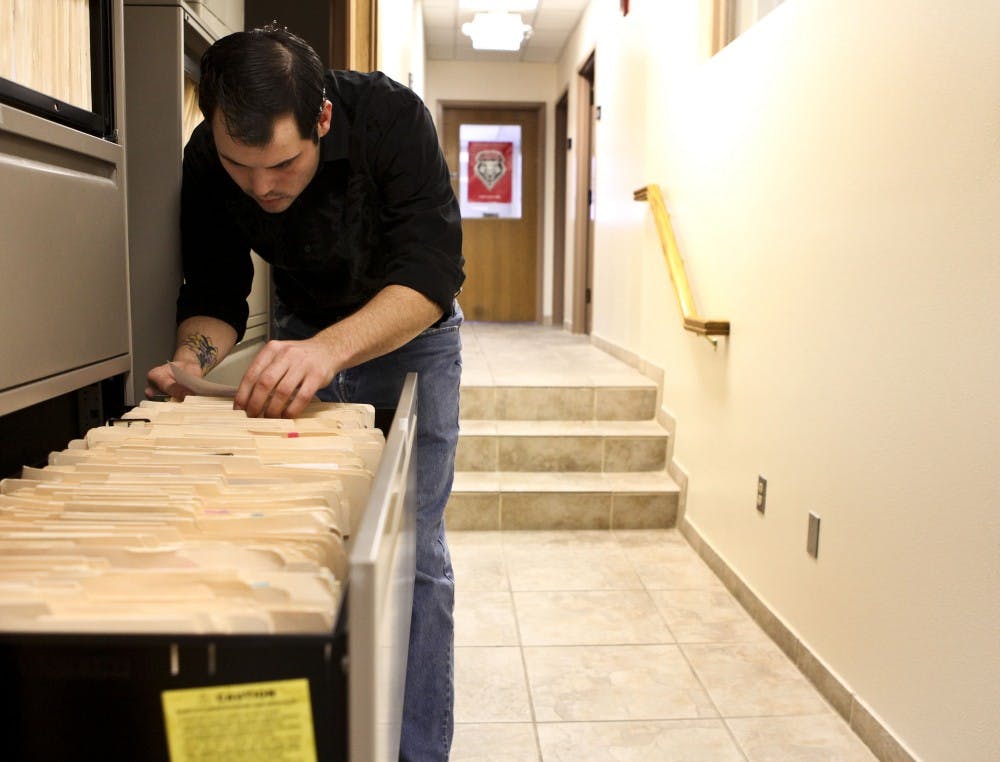For some student veterans, navigating through a crowded campus is stressful.
Joey Diaz, Student Veterans of UNM president, said he knows a student veteran who refuses to walk across Smith Plaza.
“Most people don’t see anything wrong with walking through a crowded area,” he said. “Somebody could run at you with a grenade. All they have to do is pull out the handle and you’re dead. As a veteran of the military, because you’ve been exposed to these kinds of situations, it’s always in the back of your head somewhere. … You just can’t relax, you know?”
Diaz, a senior math major, said he plans on teaching high school math after graduating. He also plays drums in the local band Throw the Temple.
Six years ago, however, he was building bullets and smart bombs in Japan.
“I got there when I was 18. I left there when I was 20,” he said. “I spent the prime of my youth in one of the best places in the world. We were kids. We were in a foreign country, and we did everything we wanted.”
Although he found time to explore, Diaz worked 16 hours a day, seven days a week.
“Learning how to grow up and become an adult by myself was the most challenging part,” he said. “They expect you to be an adult. They don’t give you chances. If you screw up they don’t go, ‘Oh, you’re just an 18-year-old kid.’”
Diaz said just because he wasn’t shooting on the front lines doesn’t mean danger wasn’t eminent. He was constantly surrounded by high-explosive material. His safety depended on everyone doing his or her job correctly. If someone walked into the room of 20 mm bullets and forgot to discharge the electrostatic energy from their body, it could ignite a bullet. When flares go off they burn at 2,600 degrees, he said. He said someone set off a flare in one of the shops, killing two people.
“In an enclosed building, it’s going to suck the oxygen out of that building so fast that it will literally suck your lungs out of your mouth,” he said. “So danger is relative in the military. Everyone’s in inherent danger because you signed a piece of paper saying your life belongs to the government.”
When Diaz came back to New Mexico, he got a job as a troubleshooter for Bernalillo County voting machines. He said leaving the military was strange because he was used to following orders.
“Going to the military right out of high school, your socialization happens in the military, which changes you in a way, fundamentally,” he said. “In one sense you feel the excitement of living on our own terms again. On the other hand, it’s sort of intimidating because you don’t know what to expect.”
He said everyday activities took some getting used to.
“It sounds really stupid and simple but, for me, it was weird getting up every day and picking out clothes to go to work in,” he said. “When you’re in the military, every day you get up and put on the same uniform. You get up and look in this closet full of clothes and think, ‘What do I wear?’ You have so much freedom you don’t know what to do with yourself.”
Get content from The Daily Lobo delivered to your inbox
Diaz said he joined the military because he wanted to defend the U.S., and that for some military volunteers, it’s the only way out of a bad life situation.
“Take, for instance, a poor kid in the projects,” Diaz said. “He has no other opportunity in life. He can stay in the project and lead a life of crime or go into the military and earn an honest paycheck. If they want to impart a positive change on themselves, they’re going to go into the military.”






